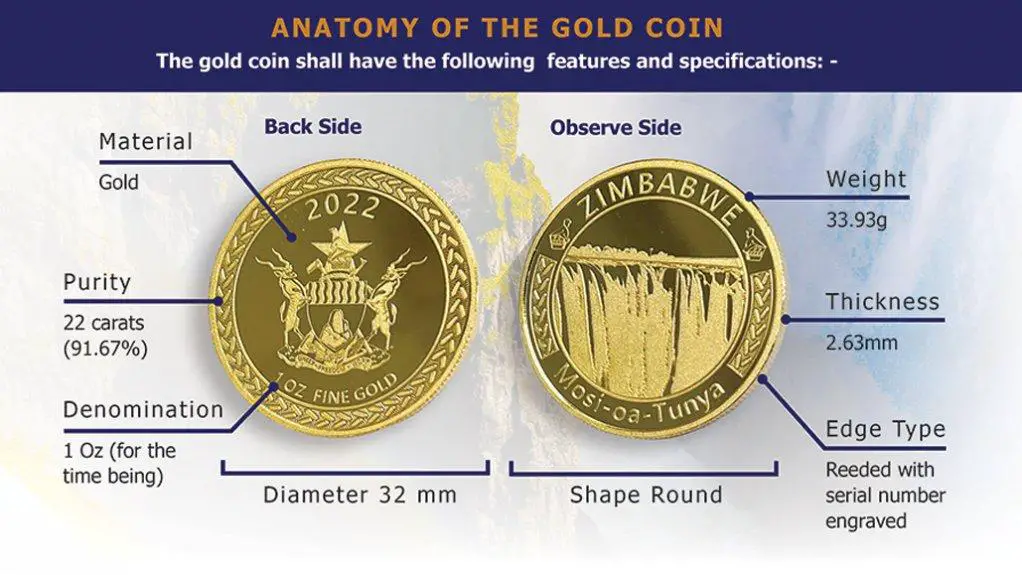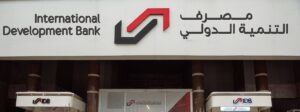- Exporting entities shall buy Mosi-oa-Tunya gold coins from their retained export portions in foreign currency. Notwithstanding this requirement, exporters whose annual export receipts in 2021 were less than US$1 million shall require a specific exchange control approval
- The bank or its agents will buy back the gold coins after a vesting period of 180 days in line with the need to promote a savings culture in the country
- The bank shall publish the Mosi-oa-Tunya gold coin price by 0800 hours daily, which shall be based on the previous day’s London Bullion Market Association (LBMA) PM Fix plus the cost of producing the coin
Zimbabwe’s central bank today will introduce gold coins aimed at battling a resurgence in inflation and easing the public’s thirst for US dollars.
According to the Reserve Bank of Zimbabwe (RBZ), the gold coins shall have the qualities such as liquid asset status, prescribed asset status, collateral acceptability, tradable, serial numbering, and central bank buy-back when required by the holder of the gold coin.
According to the guidelines released by the central bank on Monday last week, the apex bank said residents and international buyers should be allowed to take out (export) the gold coins supported by the bearer certificate for each coin.
Read: Reserve Bank of Zimbabwe to introduce gold coins
“Exporting entities shall buy Mosi-oa-Tunya gold coins in foreign currency from their retained export portions. Notwithstanding this requirement, exporters whose annual export receipts in 2021 were less than US$1 million shall require a specific exchange control approval to be permitted to utilise a portion of their surrender portion that is payable in local currency to purchase the gold coins,” they said.
The Reserve Bank of Zimbabwe will appoint agents that include authorized dealers, its subsidiaries, and foreign banks that will be responsible for selling the Mosi-oa-Tunya gold coins on its behalf.

All sales of the gold coin, weighing 33.93g, by the agents would be subject to normal know-your-customer (KYC) principles in line with international best practices, which include the declaration of the source of funds.
“The gold coins shall be sold at the prevailing international price of gold plus 5% to cover the cost of production and distribution of the coin on a payment vs delivery basis,” the guidelines read in part.
“The bank shall publish the Mosi-oa-Tunya gold coin price by 0800 hours daily, which shall be based on the previous day’s London Bullion Market Association (LBMA) PM Fix plus the cost of producing the coin. The Mosi-oa-Tunya gold coins shall be sold with an accompanying bearer certificate with security features.”
In an article dated July 20, 2022, Newsday reported that the denominated currencies to buy gold coins will include the British pound, the euro, the US dollar, the Australian dollar, Botswana pula, and South African rand.
The agent shall transfer to the Reserve Bank within 24 hours the amounts received from purchasers in the purchase currencies.
The central bank also said domestic buyers, including individuals, may buy in local currency or foreign currency.
“Domestic corporates, including institutional investors, will be allowed to buy gold coins in local currency or foreign currency, subject to quantity restrictions where it is deemed necessary,” the RBZ said.
However, the RBZ said local banking institutions shall not be allowed to buy the gold coins for their portfolios until the apex bank grants permission.
“Thus, for the time being, banks can only receive the coins from the Reserve Bank for onward selling to their customers on behalf of the Reserve Bank; non-resident (international) buyers shall only buy the Mosi-oa-Tunya gold coins in denominated foreign currencies,” it said.
Once the agent has received the payment through normal banking channels, the RBZ said buyers would be allowed to take physical possession and ownership of the gold coin or opt to keep the gold coin through a registered bank (custodial services) on terms and conditions of the service provider.
It said at the discretion of the holder of the gold coin, the bank or its agents will buy back the gold coins after a vesting period of 180 days in line with the need to promote a savings culture in the country.
“Disbursements of gold coins to bank agents shall be determined by the rating and size of the agent, as well as the demand and supply of gold coins. Agents are expected to provide daily returns to the bank for monitoring and compliance. The relevant templates shall be provided to the appointed agents,” RBZ said.
According to an article by Bulawayo24 News published on June 8, 2022, Gold is one of Zimbabwe’s major foreign currency earners. But the RBZ said selling the gold coins exclusively in US dollars will go against the objectives of what policymakers want to achieve.
Monetary authorities have made an undertaking to support the trading of the coins in local currency to tame exchange rate volatility and ensure price stability
According to The Sunday Mail, demand for foreign currency is understood to be driven by rising demand by importers and lingering fears of hyperinflation.
“Because of hyperinflation and past experiences, people in Zimbabwe have increased demand for foreign currency as a store of value,” said central bank Governor Dr. Mangudya.
“So, we have introduced the gold coin to provide an alternative product for those who want to store value, including those with excess balances and those who have foreign currency under their pillows.
“Its first positive impact is that it provides a safe and secure investment for those living in perpetual fear of hyperinflation and losing value
Stabilization of the local currency, he said, was at the centre of the new initiative.
Dr. Mangudya said: “If we sell it in foreign currency, what are we trying to achieve? The local currency is the Zimbabwe dollar, which we want to strengthen. We are providing people with a product that will give them peace of mind. We cannot say we do not want to strengthen our local currency because of arbitrage. We cannot leave our currency unattended. It is a functional currency, and we want to stabilize it.”
According to News Central, Zimbabwe’s gold output jumped 86.3% in the first five months of 2022 to 13,171,58kg compared to 7,068,85kg in the corresponding period last year.
Production figures by Fidelity Printers and Refiners, the country’s sole gold buyer, revealed that last month’s gold output by both small-scale and large-scale miners went up to 2,994,75kg compared to 1,668,01kg in the preceding year.
President Emmerson Mnangagwa announced at the chamber of Mines of Zimbabwe’s annual conference in Victoria Falls in June that the value of mineral output in the country was at US$6 billion from US$5.2 billion in 2021.




